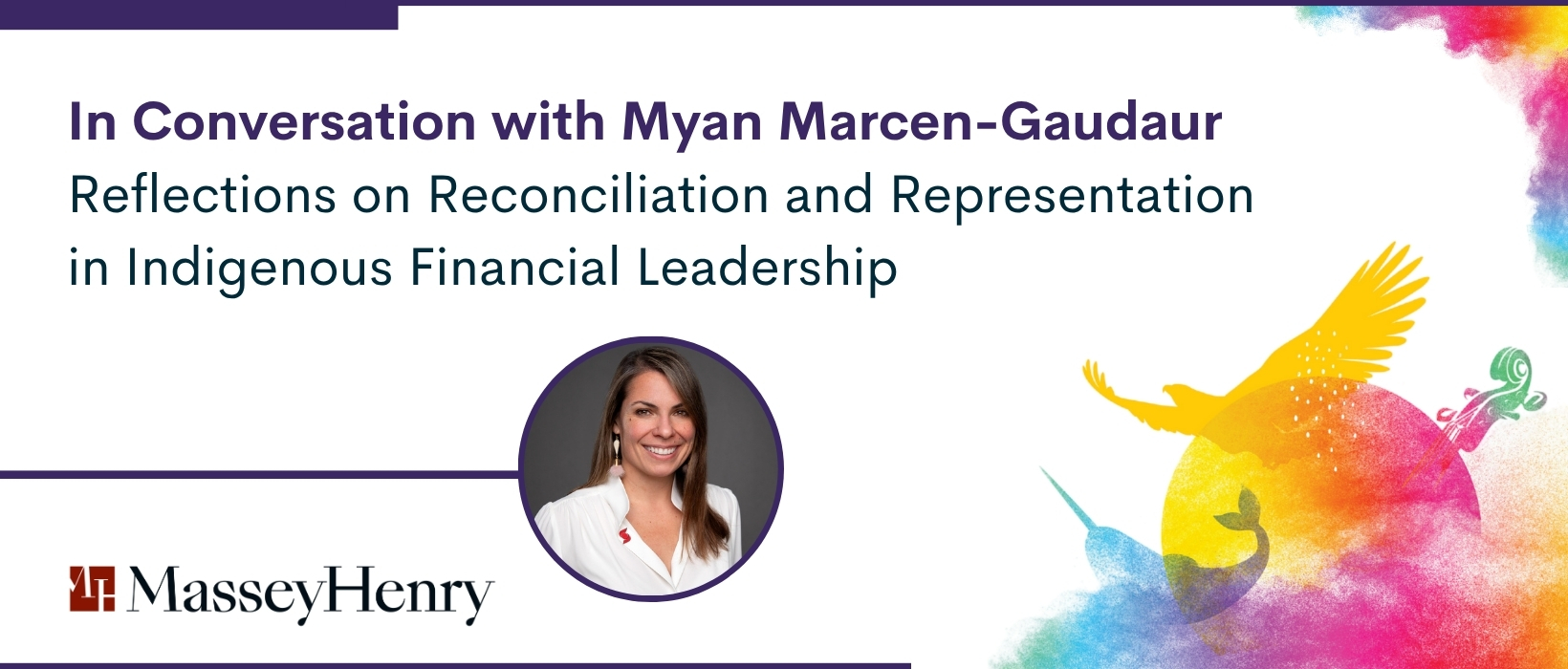
In a recent Q&A, we spoke with Myan Marcen-Gaudaur, Director, Indigenous Relations & Reconciliation of Scotiabank, about her unique journey to the role and her personal connection to the Indigenous community and National Indigenous History Month.
Myan also shares thoughtful guidance on how Canada’s financial services sector can create more pathways for representation and reconciliation.
Below are some highlights from our conversation.
My work in the space of reconciliation has coincided with my own personal journey. While transferable professional skillsets have certainly contributed to my success in this space, so too has my ability to recognize and apply Indigenous knowledge and values. The more time I spend in this area, the better I connect with the values and knowledge that have been passed down since time immemorial, and the deeper my connection, the better I am at this work.
1. Your journey into the role of Director of Indigenous Relations and Reconciliation at Scotiabank is inspiring. What led you to pursue this path, and how have your lived experiences shaped your approach to the work?
A Vice President at my previous company put my name forward for a new role they were creating on their Client Segments team — a role that would oversee the development of an Indigenous retail client segment. By then I’d been in marketing and sponsorship for 15 years.
When I got the call, my first reaction was “no way, I can’t do that.” I didn’t think I had any of the skills or experience they needed, but it’s a good lesson to never say no until you know what you’re saying no to.
Living in a major urban centre like Toronto, I took for granted fair access to banking products and services. But the truth is, although equity access to basic banking should be a human right, many people in Canada do not have access to a bank or banking products and services designed with them in mind, and this is especially true of Indigenous communities. The more I reflected on the job I was being asked to consider, the more urgently I wanted to work with the financial industry address these disparities.
I didn’t know what I was getting into at first, but as professionals, we all have transferable skillsets that allow us to adapt into other fields even if we’ve only ever done one thing.
I also drew on my own lived experience as a woman reclaiming her Indigeneity.
Many of our parents were raised to be secretly proud of our ancestry or to believe our Indigeneity was somehow a thing of the past. Many of our parents instilled these same survival protocols in us. But in 2025, things have changed. The true history of Canada has been revealed and the collective journey to revive our culture, language, values, and rights is underway. The ties that bind us to our ancestors and keepers of these lands cannot be broken despite two hundred plus years of attempts.
My work in the space of reconciliation has coincided with my own personal journey.
While transferable professional skillsets have certainly contributed to my success in this space, so too has my ability to recognize and apply Indigenous knowledge and values. The more time I spend in this area, the better I connect with the values and knowledge that has been passed down since time immemorial, and the deeper my connection, the better I am at this work.
2. As we mark National Indigenous History Month, what does this moment mean to you personally?
I am so proud of the work that has been accomplished in a relatively short period of time.
Today, Elders are telling their truths, Indigenous youth know their rights, companies across all sectors are dismantling colonial systems to build relationships of trust among Indigenous Peoples, and the public educational system is finally telling the truth about Canada’s history.
I always reflect on my grandpa Jake. He was proud of his Ojibwe roots but like every Indigenous person of his generation, he kept it private.
In the later stages of his life, he did begin to let his Indigeneity emerge, but there was more there — more knowledge, value, and perspectives that were lost with his passing.
He passed away in 2007 and I wish so much we could have a conversation about his lived experiences. So much has changed so quickly in the years since he died.
His professional success as an athlete and leader was unusual for a man of “mixed raced,” and his success was predicated on abiding by the rules of assimilation.
Never in his wild dreams could he imagine that his granddaughter would be building her career on its great undoing. I derive a lot of purpose from that.
3. You’ve said that corporate reconciliation is “like a language” — something learned through commitment, time, and practice. What does true leadership in reconciliation look like within Canada’s financial institutions, and where are you seeing meaningful progress?
I like using the analogy of language when talking about corporate reconciliation.
Like a new language, reconciliation takes time to learn, its complex, and it needs to be informed by the language keepers. It can be lost if not maintained, and for it to be effective, it needs to be understood and shared among all, not just a few.
From my experience, true corporate reconciliation leadership in this space requires vulnerability and patience. It requires a willingness to cultivate relationships with Indigenous communities, an understanding and acknowledgement of how the company has contributed to exclusionary policies and practices, whether passively or actively, and it requires sustained investment into resources to support the work.
I’m seeing a lot of progress being made through education. This makes sense because without truth, how do companies know what they are reconciling for? We can’t do this work without unlocking the true history of Canada and I’m pleased with the willingness more organizations are taking to educate their workforces.
As I look forward, fostering Indigenous economic development through our reconciliation strategies can lead to a stronger economy and improved social outcomes for all Canadians.
Indigenous businesses need to be at the heart of our Made In Canada action plan. Now more than ever, corporate Canada’s commitment to reconciliation will be demonstrated by our investment in and partnership with the Indigenous economy and by ensuring that Made in Indigenous Canada is a central feature of our business priorities.
4. How can Canadian financial institutions create space for more Indigenous voices in leadership roles?
To attract and retain Indigenous leaders, companies need to cultivate a culture of reconciliation to help employees feel culturally safe and set up for long-term growth.
Education is a big part of this but so too is a company’s willingness to create space for the differences in thinking and approach that an Indigenous person might have. There is nothing more harmful than hiring Indigenous talent for their differences then driving them away when they don’t comply to company standards.
Creating remote roles is also an important way to expand access to Indigenous talent. This ensures Indigenous professionals can live closer to their communities, while also promoting diversity in perspectives.
The absence of Indigenous representation at the leadership level poses considerable risk for corporate Canada. Elevating Indigenous voices into leadership roles helps to strengthen decision-making, promotes economic reconciliation, and ensures that Indigenous perspectives inform strategic priorities.
Representation can also help combat stereotypes and create environments where Indigenous Peoples feel valued and are therefore encouraged to stay and grow with an organization which, in turn, fosters the pool of Indigenous leaders.
About Massey Henry
Executive Search, Coaching, Assessment, and Advisory Services

Michael Henry
Managing Partner, Massey Henry

John Sanders
Senior Partner, Board & CEO Services

Lisa Newey
Partner

Alex Bunyan
Partner & Head, Leadership Practice
